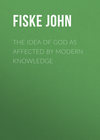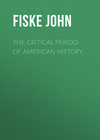Читать книгу: «The Idea of God as Affected by Modern Knowledge», страница 3
III
Sources of the Theistic Idea
Our argument may fitly begin with an inquiry into the sources of the theistic idea and the shape which it has universally assumed among untutored men. The most primitive element which it contains is doubtless the notion of dependence upon something outside of ourselves. We are born into a world consisting of forces which sway our lives and over which we can exercise no control. The individual man can indeed make his volition count for a very little in modifying the course of events, but this end necessitates strict and unceasing obedience to powers that cannot be tampered with. To the behaviour of these external powers our actions must be adapted under penalty of death. And upon grounds no less firm than those on which we believe in any externality whatever, we recognize that these forces antedated our birth and will endure after we have disappeared from the scene. No one supposes that he makes the world for himself, so that it is born and dies with him. Every one perforce contemplates the world as something existing independently of himself, as something into which he has come, and from which he is to go; and for his coming and his going, as well as for what he does while part of the world, he is dependent upon something that is not himself.
Between ancient and modern man, as between the child and the adult, there can be no essential difference in the recognition of this fundamental fact of life. The primitive man could not, indeed, state the case in this generalized form, any more than a young child could state it, but the facts which the statement covers were as real to him as they are to us.3 The primitive man knew nothing of a world, in the modern sense of the word. The conception of that vast consensus of forces which we call the world or universe is a somewhat late result of culture; it was reached only through ages of experience and reflection. Such an idea lay beyond the horizon of the primitive man. But while he knew not the world, he knew bits and pieces of it; or, to vary the expression, he had his little world, chaotic and fragmentary enough, but full of dread reality for him. He knew what it was to deal from birth until death with powers far mightier than himself. To explain these powers, to make their actions in any wise intelligible, he had but one available resource; and this was so obvious that he could not fail to employ it. The only source of action of which he knew anything, since it was the only source which lay within himself, was the human will;4 and in this respect, after all, the philosophy of the primeval savage was not so very far removed from that of the modern scientific thinker. The primitive man could see that his own actions were prompted by desire and guided by intelligence, and he supposed the same to be the case with the sun and the wind, the frost and the lightning. All the forces of outward nature, so far as they came into visible contact with his life, he personified as great beings which were to be contended with or placated. This primeval philosophy, once universal among men, has lasted far into the historic period, and it is only slowly and bit by bit that it has been outgrown by the most highly civilized races. Indeed the half-civilized majority of mankind have by no means as yet cast it aside, and among savage tribes we may still see it persisting in all its original crudity. In the mythologies of all peoples, of the Greeks and Hindus and Norsemen, as well as of the North American Indians and the dwellers in the South Sea islands, we find the sun personified as an archer or wanderer, the clouds as gigantic birds, the tempest as a devouring dragon; and the tales of gods and heroes, as well as of trolls and fairies, are made up of scattered and distorted fragments of nature-myths, of which the primitive meaning had long been forgotten when the ingenuity of modern scholarship laid it bare.5
In all this personification of physical phenomena our prehistoric ancestors were greatly assisted by that theory of ghosts which was perhaps the earliest speculative effort of the human mind. Travellers have now and then reported the existence of races of men quite destitute of religion, or of what the observer has learned to recognize as religion; but no one has ever discovered a race of men devoid of a belief in ghosts. The mass of crude inference which makes up the savage's philosophy of nature is largely based upon the hypothesis that every man has another self, a double, or wraith, or ghost. This "hypothesis of the other self, which serves to account for the savage's wanderings during sleep in strange lands and among strange people, serves also to account for the presence in his dreams of parents, comrades, or enemies, known to be dead and buried. The other self of the dreamer meets and converses with the other selves of his dead brethren, joins with them in the hunt, or sits down with them to the wild cannibal banquet. Thus arises the belief in an ever-present world of ghosts, a belief which the entire experience of uncivilized man goes to strengthen and expand."6 Countless tales and superstitions of savage races show that the hypothesis of the other self is used to explain the phenomena of hysteria and epilepsy, of shadows, of echoes, and even of the reflection of face and gestures in still water. It is not only men, moreover, who are provided with other selves. Dumb beasts and plants, stone hatchets and arrows, articles of clothing and food, all have their ghosts;7 and when the dead chief is buried, his wives and servants, his dogs and horses, are slain to keep him company, and weapons and trinkets are placed in his tomb to be used in the spirit-land. Burial-places of primitive men, ages before the dawn of history, bear testimony to the immense antiquity of this savage philosophy. From this wholesale belief in ghosts to the interpretation of the wind or the lightning as a person animated by an indwelling soul and endowed with quasi-human passions and purposes, the step is not a long one. The latter notion grows almost inevitably out of the former, so that all races of men without exception have entertained it. That the mighty power which uproots trees and drives the storm-clouds across the sky should resemble a human soul is to the savage an unavoidable inference. "If the fire burns down his hut, it is because the fire is a person with a soul, and is angry with him, and needs to be coaxed into a kindlier mood by means of prayer or sacrifice." He has no alternative but to regard fire-soul as something akin to human-soul; his philosophy makes no distinction between the human ghost and the elemental demon or deity.
It was in accordance with this primitive theory of things that the earliest form of religious worship was developed. In all races of men, so far as can be determined, this was the worship of ancestors.8 The other self of the dead chieftain continued after death to watch over the interests of the tribe, to defend it against the attacks of enemies, to reward brave warriors, and to punish traitors and cowards. His favour must be propitiated with ceremonies like those in which a subject does homage to a living ruler. If offended by neglect or irreverent treatment, defeat in battle, damage by flood or fire, visitations of famine or pestilence, were interpreted as marks of his anger. Thus the spirits animating the forces of nature were often identified with the ghosts of ancestors, and mythology is filled with traces of the confusion. In the Vedic religion the pitris, or "fathers," live in the sky along with Yama, the original pitri of mankind: they are very busy with the weather; they send down rain to refresh the thirsty earth, or anon parch the fields till the crops perish of drought; and they rush along in the roaring tempest, like the weird host of the wild huntsman Wodan. To the ancient Greek the blue sky Uranos was the father of gods and men, and throughout antiquity this mingling of ancestor-worship with nature-worship was general. With the systematic development of ethnic religions, in some instances ancestor-worship remained dominant, as with the Chinese, the Japanese, and the Romans; in others, a polytheism based upon nature-worship acquired supremacy, as with the Hindus and Greeks, and our own Teutonic forefathers. The great divinities of the Hellenic pantheon are all personifications of physical phenomena. At a comparatively late date the Roman adopted these divinities and paid to them a fashionable and literary homage, but his solemn and heartfelt rites were those with which he worshipped the lares and penates in the privacy of his home. His hospitable treatment of the gods of a vanquished people was the symptom of a commingling of the various local religions of antiquity which insured their mutual destruction and prepared the way for their absorption into a far grander and truer system.9
IV
Development of Monotheism
Such an allusion to the Romans, in an exposition like the present one, is not without its significance. It was partly through political circumstances that a truly theistic idea was developed out of the chaotic and fragmentary ghost theories and nature-worship of the primeval world. To the framing of the vastest of all possible conceptions, the idea of God, man came but slowly. This nature-worship and ancestor-worship of early times was scarcely theism. In their recognition of man's utter dependence upon something outside of himself which yet was not wholly unlike himself, these primitive religions contained the essential germ out of which theism was to grow; but it is a long way from the propitiation of ghosts and the adoration of the rising sun to the worship of the infinite and eternal God, the maker of heaven and earth, in whom we live, and move, and have our being. Before men could arrive at such a conception, it was necessary for them to obtain some integral idea of the heaven and the earth; it was necessary for them to frame, however inadequately, the conception of a physical universe. Such a conception had been reached by civilized peoples before the Christian era, and by the Greeks a remarkable beginning had been made in the generalization and interpretation of physical phenomena. The intellectual atmosphere of Alexandria, for two centuries before and three centuries after the time of Christ, was more modern than anything that followed down to the days of Bacon and Descartes; and all the leaders of Greek thought since Anaxagoras had been virtually or avowedly monotheists. As the phenomena of nature were generalized, the deities or superhuman beings regarded as their sources were likewise generalized, until the conception of nature as a whole gave rise to the conception of a single Deity as the author and ruler of nature; and in accordance with the order of its genesis, this notion of Deity was still the notion of a Being possessed of psychical attributes, and in some way like unto Man.
But there was another cause, besides scientific generalization, which led men's minds toward monotheism. The conception of tutelar deities, which was the most prominent practical feature of ancestor-worship, was directly affected by the political development of the peoples of antiquity. As tribes were consolidated into nations, the tutelar gods of the tribes became generalized, or the god of some leading tribe came to supersede his fellows, until the result was a single national deity, at first regarded as the greatest among gods, afterwards as the only God. The most striking instance of this method of development is afforded by the Hebrew conception of Jehovah. The most primitive form of Hebrew religion discernible in the Old Testament is a fetichism, or very crude polytheism, in which ancestor-worship becomes more prominent than nature-worship. At first the teraphim, or tutelar household deities, play an important part, but nature-gods, such as Baal, and Moloch, and Astarte, are extensively worshipped. It is the plural elohim who create the earth, and whose sons visit the daughters of antediluvian men. The tutelar deity, Jehovah, is originally thought of as one of the elohim, then as chief among elohim, and Lord of the hosts of heaven. Through his favour his chosen prophet overcomes the prophets of Baal, he is greater than the deities of neighbouring peoples, he is the only true god, and thus finally he is thought of as the only God, and his name becomes the symbol of monotheism. The Jews have always been one of the most highly-gifted races in the world. In antiquity they developed an intense sentiment of nationality, and for earnestness and depth of ethical feeling they surpassed all other peoples. The conception of Jehovah set forth in the writings of the prophets was the loftiest conception of deity anywhere attained before the time of Christ; in ethical value it immeasurably surpassed anything to be found in the pantheon of the Greeks and Romans. It was natural that such a conception of deity should be adopted throughout the Roman world. At the beginning of the Christian era the classic polytheism had well-nigh lost its hold upon men's minds; its value had become chiefly literary, as a mere collection of pretty stories; it had begun its descent into the humble realm of folk-lore. For want of anything better people had recourse to elaborate Eastern ceremonials, or contented themselves with the time-honoured domestic worship of the lares and penates. Yet their minds were ripe for some kind of monotheism, and in order that the Jewish conception should come to be generally adopted, it was only necessary that it should be freed from its limitations of nationality, and that Jehovah should be set forth as Sustainer of the universe and Father of all mankind. This was done by Jesus and Paul. The theory of divine action implied throughout the gospels and the epistles was the first complete monotheism attained by mankind, or at least by that portion of it from which our modern civilization has descended. Here for the first time we have the idea of God dissociated from the limiting circumstances with which it had been entangled in all the ethnic religions of antiquity. Individual thinkers here and there had already, doubtless, reached an equally true conception, as was shown by Kleanthes in his sublime hymn to Zeus;10 but it was now for the first time set forth in such wise as to win assent from the common folk as well as the philosophers, and to make its way into the hearts of all men. Its acceptance was hastened, and its hold upon mankind immeasurably strengthened, by the divinely beautiful ethical teaching in which Jesus couched it, – that teaching, so often misunderstood yet so profoundly true, which heralded the time when Man shall have thrown off the burden of his bestial inheritance and strife and sorrow shall cease from the earth.11
We shall presently see that in its fundamental features the theism of Jesus and Paul was so true that it must endure as long as man endures. Changes of statement may alter the outward appearance of it, but the kernel of truth will remain the same forever. But the shifting body of religious doctrine known as Christianity has at various times contained much that is unknown to this pure theism, and much that has shown itself to be ephemeral in its hold upon men. The change from polytheism to monotheism could not be thoroughly accomplished all at once. As Christianity spread over the Roman world it became encrusted with pagan notions and observances, and a similar process went on during the conversion of the Teutonic barbarians. Yuletide and Easter and other church holidays were directly adopted from the old nature-worship; the adoration of tutelar household deities survived in the homage paid to patron saints; and the worship of the Berecynthian Mother was continued in that of the Virgin Mary.12 Even the name God, applied to the Deity throughout Teutonic Christendom, seems to be neither more nor less than Wodan, the personification of the storm-wind, the supreme divinity of our pagan forefathers.13
That Christianity should thus have retained names and symbols and rites belonging to heathen antiquity was inevitable. The system of Christian theism was the work of some of the loftiest minds that have ever appeared upon the earth; but it was adopted by millions of men and women, of all degrees of knowledge and ignorance, of keenness and dullness, of spirituality and grossness, and these brought to it their various inherited notions and habits of thought. In all its ages, therefore, Christian theism has meant one thing to one person, and another thing to another. While the highest Christian minds have always been monotheistic, the multitude have outgrown polytheism but slowly; and even the monotheism of the highest minds has been coloured by notions ultimately derived from the primeval ghost-world which have interfered with its purity, and have seriously hampered men in their search after truth.
In illustration of this point we have now to notice two strongly contrasted views of the divine nature which have been held by Christian theists, and to observe their bearings upon the scientific thought of modern times.
V
The Idea of God as immanent in the World
We have seen that since the primitive savage philosophy did not distinguish between the human ghost and the elemental demon or deity, the religion of antiquity was an inextricable tangle of ancestor-worship with nature-worship. Nevertheless, among some peoples the one, among others the other, became predominant. I think it can hardly be an accidental coincidence that nature-worship predominated with the Greeks and Hindus, the only peoples of antiquity who accomplished anything in the exact sciences, or in metaphysics. The capacity for abstract thinking which led the Hindu to originate algebra, and the Greek to originate geometry, and both to attempt elaborate scientific theories of the universe, – this same capacity revealed itself in the manner in which they deified the powers of nature. They were able to imagine the indwelling spirit of the sun or the storm without help from the conception of an individual ghost. Such being the general capacity of the people, we can readily understand how, when it came to monotheism, their most eminent thinkers should have been able to frame the conception of God acting in and through the powers of nature, without the aid of any grossly anthropomorphic symbolism. In this connection it is interesting to observe the characteristics of the idea of God as conceived by the three greatest fathers of the Greek church, Clement of Alexandria, Origen, and Athanasius. The philosophy of these profound and vigorous thinkers was in large measure derived from the Stoics. They regarded Deity as immanent in the universe, and eternally operating through natural laws. In their view God is not a localizable personality, remote from the world, and acting upon it only by means of occasional portent and prodigy; nor is the world a lifeless machine blindly working after some preordained method, and only feeling the presence of God in so far as he now and then sees fit to interfere with its normal course of procedure. On the contrary, God is the ever-present life of the world; it is through him that all things exist from moment to moment, and the natural sequence of events is a perpetual revelation of the divine wisdom and goodness. In accordance with this fundamental view, Clement, for example, repudiated the Gnostic theory of the vileness of matter, condemned asceticism, and regarded the world as hallowed by the presence of indwelling Deity. Knowing no distinction "between what man discovers and what God reveals," he explained Christianity as a natural development from the earlier religious thought of mankind. It was essential to his idea of the divine perfection that the past should contain within itself all the germs of the future; and accordingly he attached but slight value to tales of miracle, and looked upon salvation as the normal ripening of the higher spiritual qualities of man "under the guidance of immanent Deity." The views of Clement's disciple Origen are much like those of his master. Athanasius ventured much farther into the bewildering regions of metaphysics. Yet in his doctrine of the Trinity, by which he overcame the visible tendency toward polytheism in the theories of Arius, and averted the threatened danger of a compromise between Christianity and Paganism, he proceeded upon the lines which Clement had marked out. In his very suggestive work on "The Continuity of Christian Thought," Professor Alexander Allen thus sets forth the Athanasian point of view: "In the formula of Father, Son, and Holy Spirit, as three distinct and coequal members in the one divine essence, there was the recognition and the reconciliation of the philosophical schools which had divided the ancient world. In the idea of the eternal Father the Oriental mind recognized what it liked to call the profound abyss of being, that which lies back of all phenomena, the hidden mystery which lends awe to human minds seeking to know the divine. In the doctrine of the eternal Son revealing the Father, immanent in nature and humanity as the life and light shining through all created things, the divine reason in which the human reason shares, there was the recognition of the truth after which Plato and Aristotle and the Stoics were struggling, – the tie which binds the creation to God in the closest organic relationship. In the doctrine of the Holy Spirit the church guarded against any pantheistic confusion of God with the world by upholding the life of the manifested Deity as essentially ethical or spiritual, revealing itself in humanity in its highest form, only in so far as humanity recognized its calling and through the Spirit entered into communion with the Father and the Son."
Great as was the service which these views of Athanasius rendered in the fourth century of our era, they are scarcely to be regarded as a permanent or essential feature of Christian theism. The metaphysic in which they are couched is alien to the metaphysic of our time, yet through this vast difference it is all the more instructive to note how closely Athanasius approaches the confines of modern scientific thought, simply through his fundamental conception of God as the indwelling life of the universe. We shall be still more forcibly struck with this similarity when we come to consider the character impressed upon our idea of God by the modern doctrine of evolution.





















